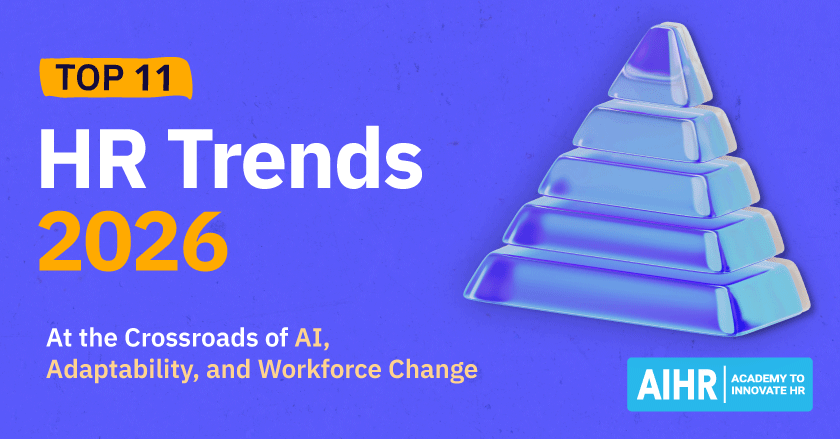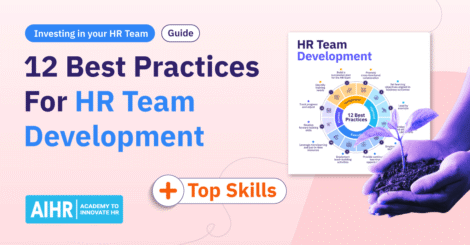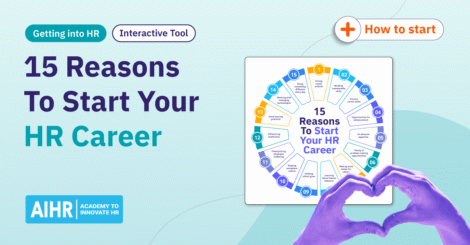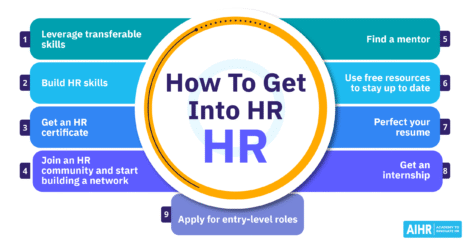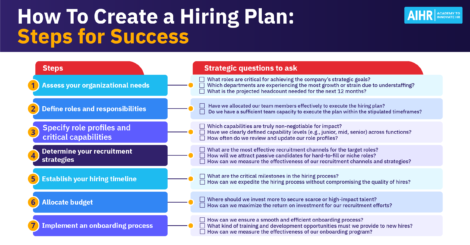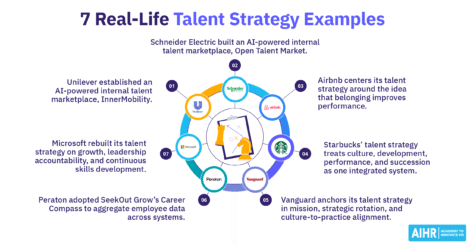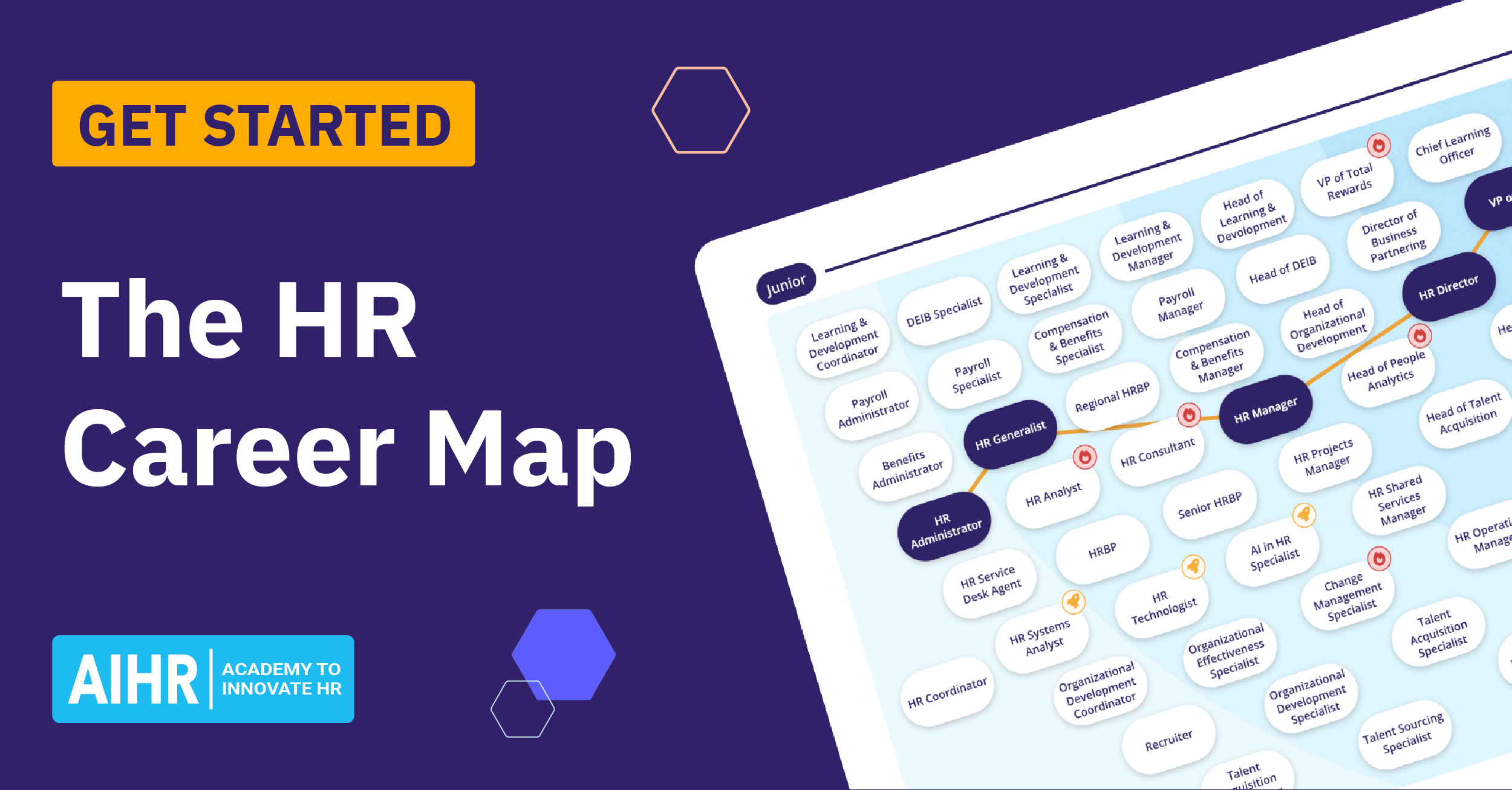The HR field is in constant flux. From emerging technologies such as AI in HR and data analytics to evolving regulations and workforce expectations, the demands on HR professionals are higher than ever. HR continuing education is now necessary to help you upskill and increase the value you offer to your organization.
This article explores the key benefits of HR continuing education, the top courses you should consider to advance professionally, and the AIHR certificate programs that can help you move up the HR career ladder.
Contents
What is HR continuing education?
The benefits of HR continuing education
What are HR continuing education units?
13 top courses for HR continuing education
Why choose AIHR’s HR courses and certificate programs?
Key takeaways
- Continuing education drives impact — better compliance and risk control, stronger leadership and engagement, and clearer career paths across the workforce.
- Accredited courses, webinars, and projects help HR professionals stay certified, current, and competitive.
- High-value areas (e.g., people analytics, digital HR, DEIB, compliance) and accredited options like AIHR, SHRM, and HRCI signal credibility and commitment.
- Advanced skills and certifications correlate with higher pay, faster promotions, and broader role options.
What is HR continuing education?
HR continuing education refers to ongoing learning that builds your skills as an HR professional, beyond initial training or certification. It may include short courses, certificates, workshops, webinars, conferences, and on-the-job projects.
The goal of HR continuing education is practical: stay current on laws, technology, and people practices, improve how you hire, develop, and retain talent, and align HR work with business goals. It should also support recertification requirements from bodies like HRCI and SHRM.
The benefits of HR continuing education
Benefits for your organization
Staying current on talent and workforce trends helps you move from administrative tasks to strategic work, solve complex problems, and drive performance that supports profitability.
You can also improve compliance and risk mitigation at your company, as ongoing learning keeps you up to date on labor rules and ethics, reducing legal and financial risk. Additionally, with stronger skills, you can design programs that improve wellbeing and satisfaction, lifting morale, engagement, and retention.
Benefits for your workforce
Upskilling can help you ensure effective leadership and management. Advanced HR skills help you coach managers on performance, conflict resolution, and change, so teams stay motivated and you can resolve issues faster.
At the same time, you’ll be able to facilitate more efficient career pathing and skills development. HR continuing education courses can equip you with the skills you need to build learning programs that close skills gaps and create clear career paths for employees.
Benefits for you
On an individual level, HR continuing education can increase your earning potential, as certifications and advanced skills are linked to higher pay and faster promotions. You’ll also enjoy expanded career opportunities, with more doors to high-demand areas like people analytics, digital HR, and compensation and benefits likely to open to you.
Last but not least, upskilling will boost your professional credibility and confidence. Completing courses proves your expertise and commitment, earning you trust from leaders and giving you the confidence to take on bigger roles.
What are HR continuing education units?
HR continuing education units (CEUs) are a standard way to track professional development. They’re often required to maintain certifications from institutions like HRCI and SHRM. Many providers list CEUs as professional development credits (PDCs) or recertification credits.
Each organization sets its own rules for what counts. A common model entails one hour of learning being equivalent to one PDC. Eligible activities include webinars, workshops, conferences, and accredited online courses.
Unlike academic credits, CEUs cover non-degree professional learning. To keep certifications like SHRM-CP or PHR, you must earn a set number of credits within a recertification cycle, usually every three years. For example, SHRM-CP and SHRM-SCP holders need 60 PDCs every three years, or must retake the exam within that period.
You can earn CEUs/PDCs through accredited programs (including those from AIHR), professional memberships, and contributions that advance your organization or the HR field.
HR continuing education examples
- Compliance and legal updates: Labor laws and workplace safety regulations are constantly evolving. Stay current to mitigate risk and ensure ethical practice.
- People analytics: Learn to use data for strategic decision-making, and master skills in predictive HR and workforce planning.
- Technology in HR: Dive into digital transformation by gaining expertise in HRIS implementation, automation, and the ethical use of AI in HR.
- Diversity, equity, inclusion, and belonging (DEIB): Complete specialized training to build an inclusive culture, enhance employee experience, and embed belonging.
- Leadership and management: Develop the soft skills crucial for coaching managers, facilitating change management, and resolving workplace conflicts.
- Employee experience and engagement strategies: Study proven employee engagement models to design programs that lift morale, support wellbeing, and improve talent retention.
Boost your HR continuing education with Full Academy Access
From essential theory and practical resources to case studies and templates, AIHR’s Full Academy Access gives you the complete toolkit to grow and advance in HR.
✅ Learn from unlimited certificate programs and new monthly courses
✅ Download and apply 500+ templates, toolkits, and playbooks instantly
✅ Accelerate your career with assessments, coaching, and career mapping
✅ Stay connected through live events, peer networking, and AIHR Copilot
🎓 Take your HR career to new heights with comprehensive Full Academy Access.
13 top courses for HR continuing education
Below is a list of the 13 best foundational programs, specialized courses, and recognized certifications that can help you upskill and advance your HR career:
1. People Analytics Certificate Program
- Provider: AIHR
- Format and duration: Online and self-paced; 42 hours over 12 weeks.
- The program covers: People analytics foundations, HR data analytics, HR dashboards in Power BI, and HR statistics in Excel.
- Cost: $1,125
- Find out more: People Analytics Certificate Program
2. Digital HR 2.0 Certificate Program
- Provider: AIHR
- Format and duration: Online and self-paced; 36 hours over 12 weeks.
- The program covers: Digital HR, the future of work, design thinking and EX, automation in HR, digital change management, and digital expertise.
- Cost: $1,125
- Find out more: Digital HR 2.0 Certificate Program
3. Essentials of Human Resources
- Provider: SHRM
- Format and duration: Online and self-paced over two days to five weeks, or in-person and instructor-led over two days.
- The program covers: Foundational HR concepts, talent development and performance, culture, HR technology, and U.S. compliance factors.
- Cost: $595 for members, $905 for non-members.
- Find out more: SHRM Essentials of Human Resources
4. People Analytics Specialty Credential
- Provider: SHRM
- Format and duration: Online, self-paced, and instructor-led; two days.
- The program covers: Data literacy, qualitative and quantitative analysis, and leading HR initiatives aligned with organizational strategy.
- Cost: $1,855 for members, $2,130 for non-members.
- Find out more: SHRM People Analytics Specialty Credential
5. Associate Professional in Human Resources (aPHR)
- Provider: HRCI
- Format and duration: Examination-based, two hours (training options available through third-party providers).
- The program covers: Foundational knowledge in five areas — compliance and risk management, employee relations, talent acquisition, learning and development, and compensation and benefits.
- Cost: $300 exam fee, plus $100 application fee.
- Find out more: Associate Professional in Human Resources (aPHR)
6. Senior Professional in Human Resources (SPHR)
- Provider: HRCI
- Format and duration: Examination-based, three hours (training options available through third-party providers).
- The program covers: Leadership, strategy, talent management, workforce planning, total rewards, and HR information management.
- Cost: $495 exam fee, plus $100 application fee.
- Find out more: Senior Professional in Human Resources (SPHR)
7. Strategic HR Leadership Certificate
- Provider: eCornell Executive Education (The ILR School)
- Format and duration: Online, instructor-led, small-group learning; three months.
- The program covers: HR leadership and strategy, DEI in practice for HR, talent management, strategic talent analytics, and strategic engagement.
- Cost: $3,900
- Find out more: Strategic HR Leadership Certificate
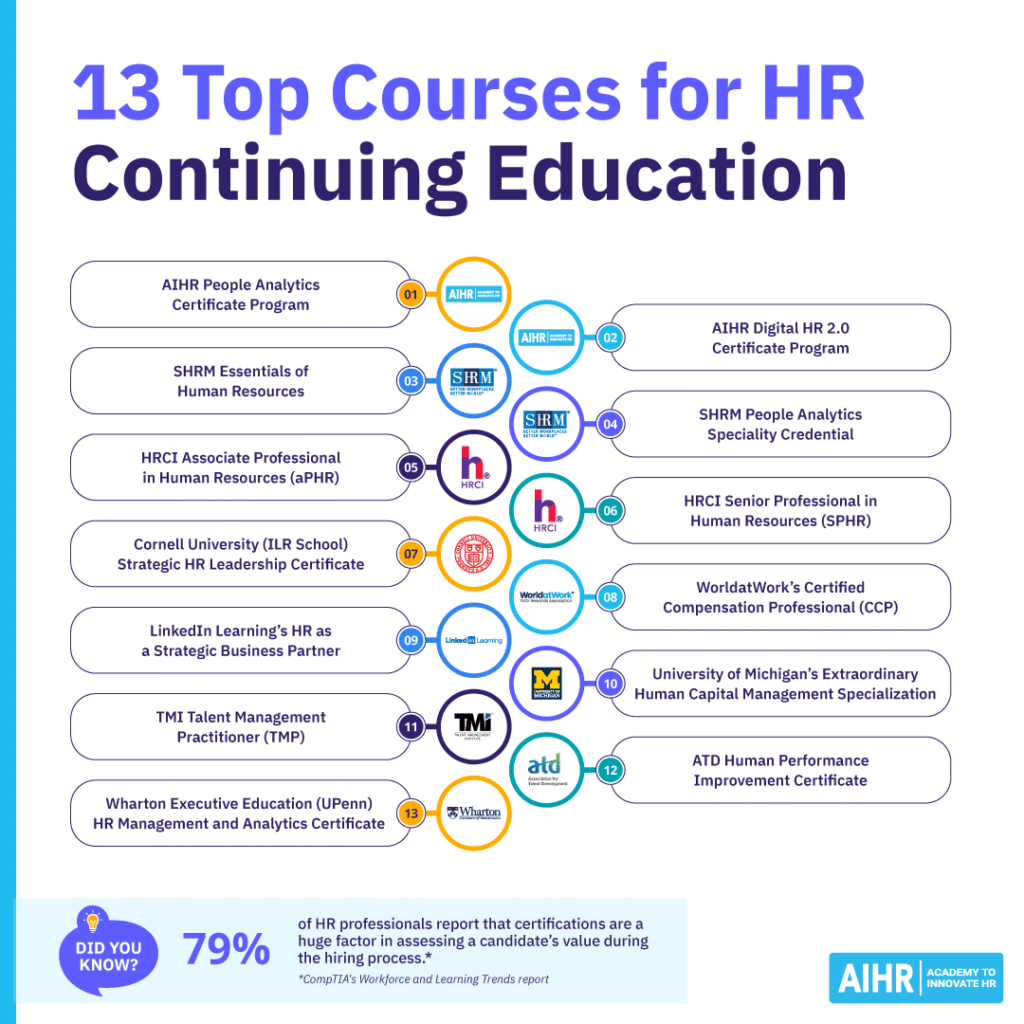
8. Certified Compensation Professional (CCP)
- Provider: WorldatWork
- Format: Examination-based certification; optional courses and eight required exams.
- The program covers: Total rewards, regulatory landscape, base and variable pay, competitive pay analysis, business acumen, and communication strategies.
- Cost: $1,395 per exam, $7,812 for all eight exams with a bundle discount.
- Find out more: Certified Compensation Professional (CCP)
9. HR as a Strategic Business Partner
- Provider: LinkedIn Learning
- Format and duration: Online, on-demand video course; 30 minutes.
- The program covers: The role of an HR Business Partner (HRBP), areas of focus for an HRBP, and scaling and assessing your HRBP efforts.
- Cost: Included in a LinkedIn Learning subscription ($39.99 per month), with a 50% discount on annual plans.
- Find out more: HR as a Strategic Business Partner
10. Extraordinary Human Capital Management Specialization
- Provider: University of Michigan (via Coursera)
- Format and duration: Online and self-paced; five courses over 50 hours.
- The program covers: Strategic HR practices, leadership principles, talent management, team dynamics, HR analytics, and ethical and legal considerations.
- Cost: Included in a Coursera subscription ($49 per month).
- Find out more: Extraordinary Human Capital Management Specialization
11. Talent Management Practitioner (TMP)
- Provider: TMI
- Format: Online, self-paced self-study; final virtual exam.
- The program covers: Talent acquisition, development, management, retention, succession planning, and effectiveness.
- Cost: $675
- Find out more: Talent Management Practitioner (TMP)
12. Human Performance Improvement Certificate
- Provider: ATD
- Format: Four online sessions over 14 hours, or an in-person two-day program; available in English or Chinese.
- The program covers: Linking business goals to human performance, identifying root causes of performance gaps, and change management principles.
- Cost: $2,225 for members, $2,525 for non-members.
- Find out more: Human Performance Improvement Certificate
13. HR Management and Analytics Certificate
- Provider: Wharton Executive Education (University of Pennsylvania)
- Format: Online two-month program; four to six hours of study per week.
- The program covers HR analytics applied to staffing cycles of hiring, internal mobility, and attrition, as well as key factors in measuring performance.
- Cost: $2,622
- Find out more: HR Management and Analytics Certificate
Why choose AIHR’s HR courses and certificate programs?
AIHR has built a strong reputation as a leader in accredited online HR education, with a commitment to providing relevant and highly practical skills. Here’s what sets its HR courses and certificate programs apart:
- Globally recognized: AIHR’s certificate programs are recognized by HR professionals, employers worldwide, and leading professional associations (including SHRM, HRCI, HRPA and CPHR).
- Digital credentials for your résumé and LinkedIn: You’ll receive a digital certificate to showcase on your résumé and LinkedIn profile once you pass each capstone project, helping you validate your skills and stand out in a competitive job market.
- Holistic HR professional framework: AIHR’s comprehensive curriculum is designed to help you become a T-shaped HR professional—someone with a broad understanding of HR essentials and deep expertise in a specific HR area.
- 100% online and on-demand: You can learn at your own pace, from anywhere in the world, with the flexibility to balance your professional development with your daily responsibilities.
- Practical, hands-on learning: AIHR focuses on application, building its courses around real-world examples, case studies, and templates you can apply in your job. This means you won’t just learn theory, but how to level up the job you’re currently doing.
HR tip
Don’t just collect credits; invest in your future by considering the critical skills you need to achieve your career goals.
For instance, if you want to be a better HRBP, focus on developing your business acumen and consulting skills. If you want to become a Digital HR Leader, prioritize training in AI and HR technology platforms. And if you want to lead with data, prioritize courses that equip you to be data-savvy.
By aligning your CEUs with your specific career ambitions, you ensure every hour and dollar you invest will prepare you for your next role.
To sum up
The role of HR has evolved beyond compliance and administration to address today’s complex challenges involving strategy, performance, technology, and data. Continuing education in HR is essential for meeting these new demands, remaining relevant in the job market, and maintaining professional certifications.
Investing in your HR education is the single most effective way to future-proof your career, increase your earning potential, and become a true asset to your organization. Take advantage of the wide variety of available courses and certifications, such as those mentioned in this article, to upskill yourself and further your career.


